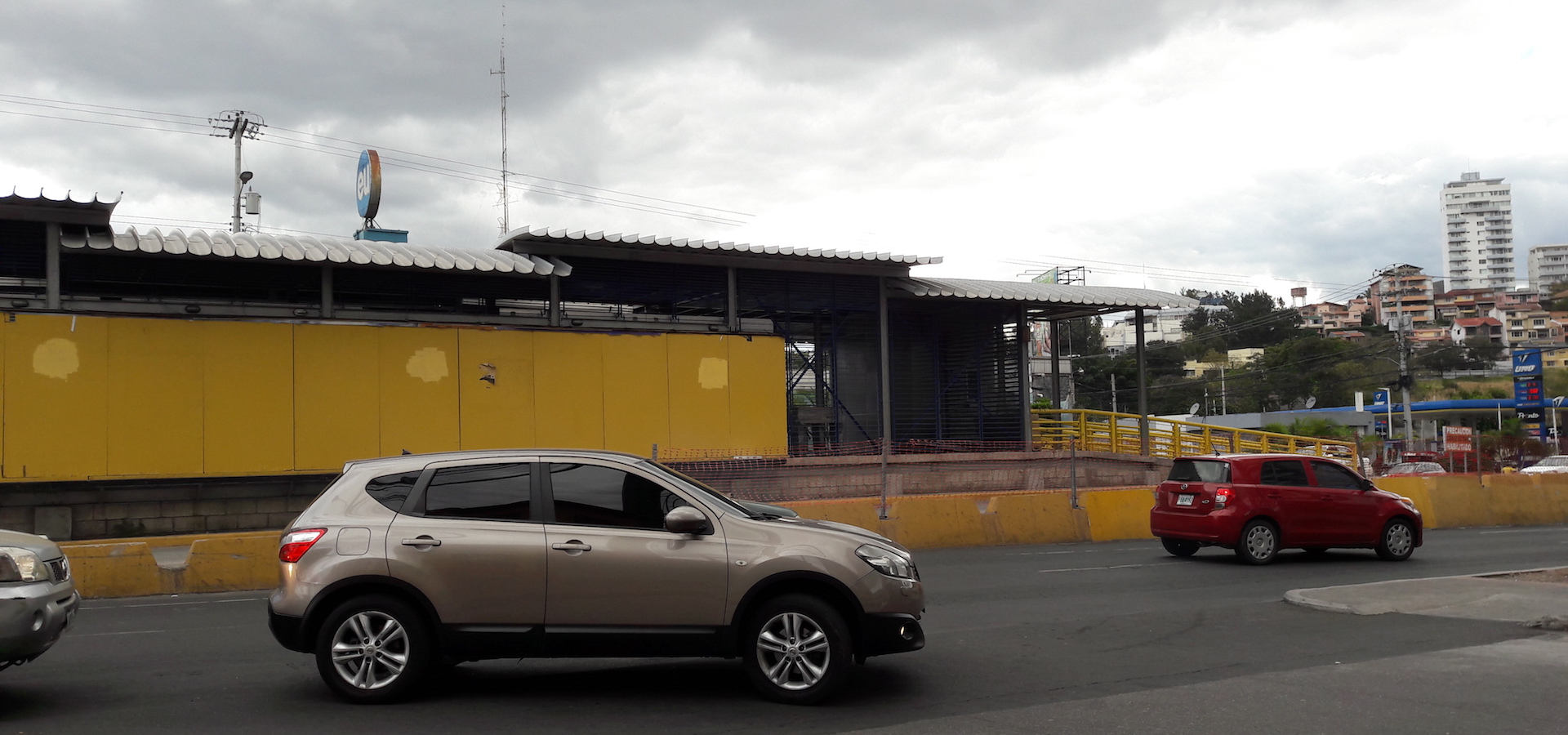Public transportation offers the potential to reduce emissions and improve quality of life – but only if it’s finished. In Honduras, the corruption of the “Trans450” project ended with boarded up bus stations and frustrated citizens, writes Rebecca Bertram.

A barricaded bus stop in Tegucigalpa, Honduras (Photo by Rebecca Bertram)
I moved to Tegucigalpa, the capital of Honduras, at the beginning of this year. It is my first time in this Central American country that does not enjoy the most favorable international image, not least because of the recent news of many Hondurans fleeing the country to the United States. This is a country with significant problems: the country has one of the highest murder rates in the world, and there are high un- und underemployment rates. This leaves much space for improvement in itself.
But in this blog, I would like to focus on how an infrastructure project, meant to improve people’s everyday lives, was turned into a corruption scandal and, as a result, has put people off the idea of investing in a cleaner, climate-friendly and more efficient transport system.
The first day I got here, I was struck by something that resembled a bus stop. It was not a usual bus stop, because its entrance was barricaded. As I got to know more of Tegucigalpa during the days that followed, I saw more of its kind – all barricaded – with separate lanes for buses, but no buses to be seen anywhere. Instead, public taxis and small so-called “public” buses (public only in the sense that they would carry more than one party at a time but otherwise privately owned by a transport mafia) move the 200,000 people dependent on public transit for their commute around the city every day.
Such “public” buses represent a very inefficient and insecure mode of public transportation. They do not follow any set schedule, and there are reports of regular assaults of passengers. This is precisely why former Mayor Ricardo Alvarez initiated the new bus infrastructure Trans450 project in Tegucigalpa in 2010. The Trans450 was set to receive a grant of 50 million US$ by the Inter-American Development Bank (IADB) and a 20 million US$ grant by the Central American Bank for Economic Integration (CABEI) and to be finalized by the year 2017.
Mayor Ricardo Alvarez had made the Trans450 one of his most important infrastructure projects during his mayoral terms between 2006 and 2014. He had secured the loans for the project and pushed it forward, even though both the country’s National Assembly and the Finance Secretary had voted against the project due to its high costs and high public debt.
“At this point, it became very clear that this was going to turn into a corrupt project,” Ismael Zepeda from the Social Forum on External Debt and Development of Honduras (FOSDEH) told me. Subsequently, funds were either spent on building the infrastructure for the Trans450 or largely disappeared without any trace of the busses. Before Ricardo Alvarez’ mayoral term came to an end in 2014, he staged an inauguration of the project, ironically only with toy busses.
Today, the project remains unfinished. The next mayor of Tegucigalpa, Nasry Asfuera, never regarded the Trans450 as his project, and as there were no more funds available, left it largely neglected. Some of the Trans450 lanes actually interfered with his own infrastructure plans to build new bridges and were subsequently destroyed. In addition, the Trans450 has met considerable opposition by the powerful transport mafia in the city who of course do not want to see any competition to their ‘private’ buses and taxis.
This has left the Trans450 largely unpopular amongst Tegucigalpans. To them, the project does not only represent a clear case of corruption and a waste of public money but also a worsening of the transit system as some important pedestrian walkways had to give way for the project. They are now increasingly reclaiming the extra bus lanes to cope with the immense traffic in this city.
The sad thing with this story is that the image of a cleaner, more efficient and secure transport option for Tegucigalpa has been destroyed through this messy and corrupt process. There are rumors that the municipality will take up the project again later this year, but I believe it when I see it.
Over the next year, I will be writing more blogs on energy and climate related issues in the Latin American region. I thank the Heinrich Böll Foundation for this opportunity to share some of my thoughts with you via this medium.